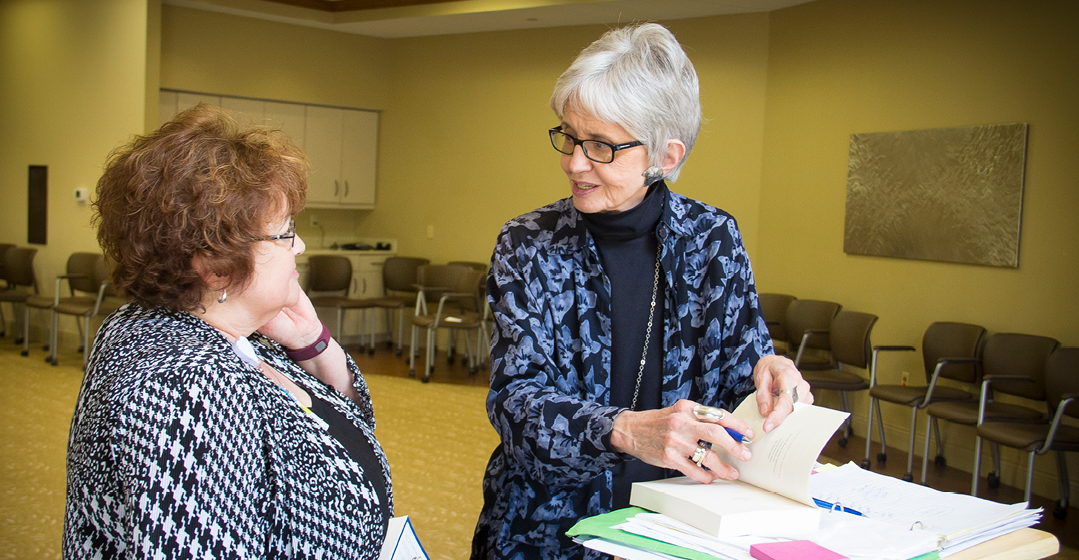
Stories Resonate When We Need Them Most
“In times of difficulty, we tell the stories again. If there’s a crisis, we tell the stories. It’s a human need; it strengthens our souls.”
So begins a nuanced discussion about listening and sharing – for patient and care giver – by a leading authority on developing simple but crucial tools that enable coping and meaning in end-of-life scenarios.
Dr. Rachel Naomi Remen, clinical professor of family and community medicine at the University of California San Francisco and clinical professor at Wright State University Boonshoft School of Medicine, recently conducted a daylong seminar for hospice professionals at Ohio’s Hospice of Dayton.
Participants in “Reclaiming Awe: A workshop on Mystery, Meaning and Resilience for Hospice Professionals” were reminded of the wonder and lessons to be learned working with people on the edge of life. “The whole purpose of the workshop was to bring more meaning to your work,” said Angelene Volpatti, an occupational therapist who works with hospice patients in their homes. “I learned practical tools,” Volpatti said, such as breath awareness. “If you don’t have meaning in your work you will burn out,” she said.
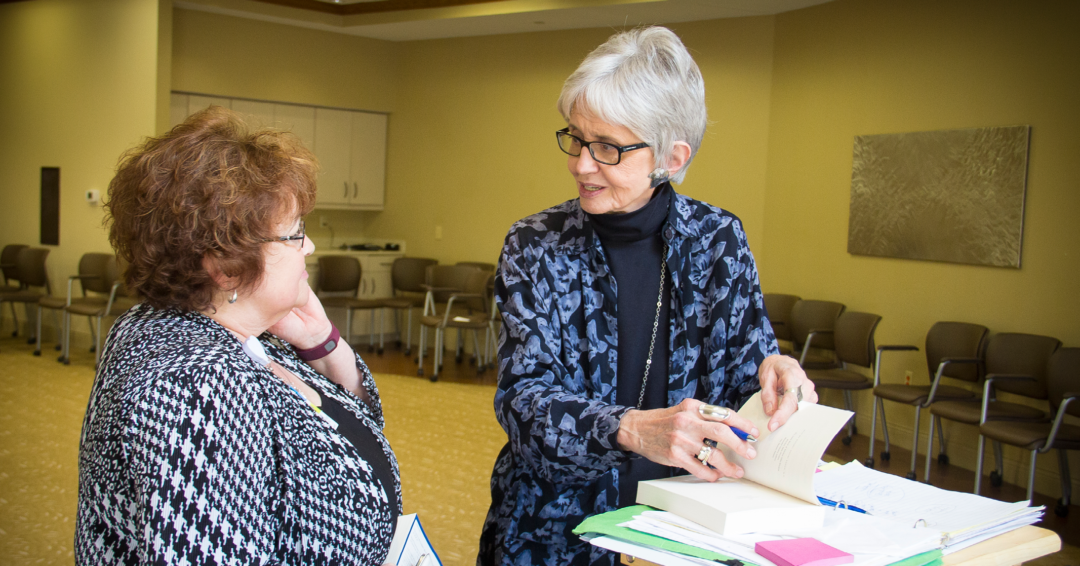
After the workshop, Dr. Remen, a pioneer of the Relationship Centered Care and Integrative Medicine, discussed her journey of restoring medicine as a calling and work of healing. A student in the 1960s of the human potential movement at the Esalen Institute in Big Sur, Ca., Dr. Remen delved into transpersonal and humanistic psychology. She said she was “taken” with the idea that value, integrity and meaning could be infused into dire and chronic diagnoses.
“When I finished with training I wanted to work with patients like myself” (she was diagnosed with Crohn’s disease 63 years ago) living with chronic illness, she said. “Even if you couldn’t fix the disease you could have a meaningful life.” She sought patients who could not find relief from conventional medicine. “I went to the medical community and asked for the patients who were taking up all their time. The first (doctor) said, ‘There is nothing I can do with them. If you want to take them off my hands, you can see all my patients.’ I had a full practice in a month and a half. They, as medical people, had nothing to offer them.” Dr. Remen said she began what she calls ‘generous listening.’ “I discovered what an important thing it is to be a human being. I found what it is to find meaning, wisdom and love. I discovered how much better they were living than their doctors.”
Then, the mysterious and deadly disease AIDS struck.
“It was like a war zone. People were afraid to touch. We didn’t know what we were dealing with. The half-life of a hospice nurse was about six weeks,” Dr. Remen said. “You would come to work on Monday and you and your team were assigned seven patients – the most creative people – and by Friday they were dead. When you came in Monday, you had another seven. People couldn’t do it.”
Dr. Remen was asked to help the people who were helping the AIDS population. “I didn’t know how to do that, but I was interested, and did some research.”
The night before a presentation, she had a dream.
“It was a group, facing outward toward San Francisco, the battle zone, sending waves of strength,” she said. “In the middle was a black hole, and if you stepped back, you’d fall into the hole.” Dr. Remen felt the group needed to “turn around and take care of each other. We were each so alone with this epidemic. If we turned around, as a community, we could do this together.” What she discovered, she said, is that the strength “is in the stories, the learning that was going on among us. So, on Friday, when everyone had died, we spent a few hours sharing the pieces of those lives, finding who each other was, and was important. The turnover stopped.”
“When we live at the edge of things – such places as hospice, war, medical epidemics – that’s where we learn what really matters.”
Dr. Remen said today’s corporate concerns about the bottom line and cost containment can inhibit these important caregiver practices.
Dr. Remen said it is an “interesting time in medicine.” She noted how high numbers of physicians are “depressed, drug-addicted, committing suicide. This has been a challenge, to look at medical education. Why are doctors so vulnerable and suffering compassion overload? We must be able to live the meaning of your work – to see meaning like you see color – and ask what is evoked by this disease? What does this tell us about the patient?”
She said one can feel “grateful to be with those people, you can be strengthened and fed. When people experience their work as having individualized meaning, that you can make a difference, there is low incidence of burnout.” Dr. Remen believes “becoming present, being able to live ‘in the neighborhood of yourself’ but seeing what is in front of yourself, is not about doing anything different, but seeing things in new ways.”
Social worker Michael Kammer, who works at the Hospice House in Dayton, said Dr. Remen’s workshop gave him “a refreshing sense of mission, and was a reminder of why I’m doing this.”
Author Profile
Latest entries
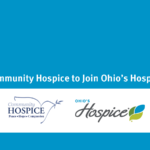 Media ReleaseJanuary 1, 2024Community Hospice to Join Ohio’s Hospice Strategic Partnership
Media ReleaseJanuary 1, 2024Community Hospice to Join Ohio’s Hospice Strategic Partnership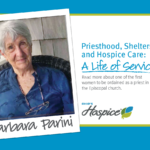 #CelebratingLifesStoriesNovember 21, 2023Priesthood, Shelters and Hospice Care: A Life of Service for Barbara Parini
#CelebratingLifesStoriesNovember 21, 2023Priesthood, Shelters and Hospice Care: A Life of Service for Barbara Parini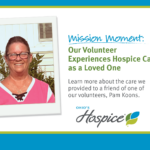 News and UpdatesJuly 28, 2023Ohio’s Hospice Volunteer Experiences Hospice Care as a Loved One
News and UpdatesJuly 28, 2023Ohio’s Hospice Volunteer Experiences Hospice Care as a Loved One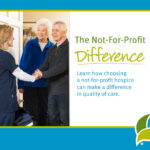 News and UpdatesJuly 19, 2023The Not-for-Profit Difference
News and UpdatesJuly 19, 2023The Not-for-Profit Difference

